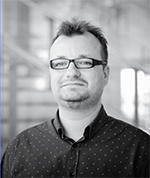Peter Buš is a Lecturer in Digital Architecture at the Digital Architecture Research Centre (DARC) at Kent School of Architecture and Planning in Canterbury, UK. He previously gained experience as a postdoctoral researcher and co-lecturer at the Chair of Information Architecture, Institute of Technology in Architecture (ITA) at the Swiss Federal Institute of Technology (ETH) in Zürich, Switzerland. After he graduated with a Master of Arts in Architecture degree from the Academy of Fine Arts and Design in Bratislava in Slovakia, he founded a design research platform Peter Buš | Architecture | Computational Design | Research, where he explores the usage of generative computer coding and advanced modelling techniques for architecture and urban environments. Prior to obtaining his PhD degree in Architecture Theory and Design from the Department of Architectural Modelling (MOLAB) at the Czech Technical University in Prague, Peter worked as a practising architect and as a researcher at the Future Cities Laboratory SEC in Singapore. Peter is registered as a member of Slovak Chamber of Architects in Slovakia. He is currently enhancing his expertise in the field of digital fabrication at the Bartlett School of architecture in London in the post-professional postgraduate programme Design for Manufacture.
In his research agenda Peter concentrates on the development of custom-based computational environments, design workflows and simulation strategies within the field of Responsive and Adaptive Cities focusing on end-users’ perspective. This includes the development of design frameworks for urban and participatory design activities and experimental modelling and building strategies for architecture. The scope of his research is mainly focused on the phenomenon of emergence within natural and built environments and how complex relational qualities influence forms of architecture and cities. He investigates potentialities of computation, digital fabrication methods, and prototyping practices for their applications of construction deliveries in large-scale urban contexts and their capacities to respond to citizens’ necessities. Within this scope, the research aims to reveal, examine, and define to what extent the return of workshop models through digital making is capable to deal with large quantities of bespoke productions.
Peter teaches graduate master architectural design studio classes as well as Principles and Methods in Bio Digital Design in a recently opened postgraduate MSc course in Bio Digital Architecture at the KSAP. In his teaching agenda he concentrates on applicability of advanced computational design strategies for architecture and urban design following a paradigm of bio-integrated phenomena within built environments at many levels.

國立聯合大學建築學系 + 英國札哈哈蒂建築師事務所 + 英國肯特大學・先進生物集成演算設計・國際建築工作營暨講座活動・International digital design workshop 2019 in Miao-Li, Taiwan・
